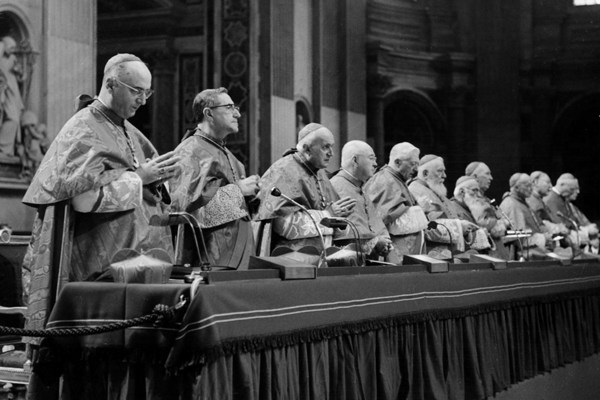
ROME (CNS) — The Second Vatican Council’s teaching, particularly on Judaism and other religions, is rooted in traditional Christian theology and the Bible, and the Catholic Church should not offer concessions to those who do not accept its teaching, said an Israeli-born Franciscan who serves as a judge on a top Vatican court.
Msgr. David Jaeger, a judge at the Roman Rota, defined as worrying a tendency, “here and there in Catholicism, to look leniently upon stray groups that are marginal but well-publicized who denounce the doctrine of the council, including the declaration ‘Nostra Aetate'” on the relationship of the church to non-Christian religions.
Msgr. Jaeger, who grew up in a Jewish family, spoke about “Nostra Aetate” during a conference on the Second Vatican Council at Rome’s Opus Dei-run Holy Cross University May 3-4.
“While often presented as if it were absolutely new,” he said, the teaching of “Nostra Aetate” “perfectly corresponds to the most ancient intuitions of Christian theology” when it affirms “there can be, and in particular cases, are elements of truth and holiness” in other religions, he said. In addition, the document emphasized that Judaism has a special status, which “already was extensively explained by St. Paul, particularly in the Epistle to the Romans.”
The council’s document explained the church’s “doctrine on Judaism, the only religion which, while not knowing Christ, has its origins in biblical revelation, which is why the church does not regard it simply as a ‘non-Christian religion,’ but ascribes to it a unique status,” Msgr. Jaeger said.
While recognizing the unique and special relationship between God and the Jewish people, he said, the council did not say say that Judaism was a “parallel path to salvation” and it did not deny that somehow, in the end, all salvation would be accomplished through Christ.
Obviously motivated by the horrors of the Holocaust, but also by centuries of injustices and persecution of Jews “by those who called themselves Christians and believed they therefore could justify their brutality, the declaration took care to severely condemn such conduct and to highlight the complete illegitimacy of supporting it with any reference to Christianity,” he said.
“The proof of Nostra Aetate’s effectiveness is that it seems strange to have to say it today,” the monsignor said.
However, he said, “One must take this occasion to express the deep hope that leniency will be denied” to anyone who does not accept the council’s teaching and “that there will be no being content with fake, quasi-adhesions accompanied by evident verbal and mental reservations to the teaching of the Second Vatican Council in general and to ‘Nostra Aetate’ in particular.”
“In fact,” he said, “the extreme gravity of the counter-witness of those who have, for centuries, abused the name of Christ and the term Christian to persecute and oppress the Jews must never be forgotten or underestimated in any way.”
— By Cindy Wooden, Catholic News Service





